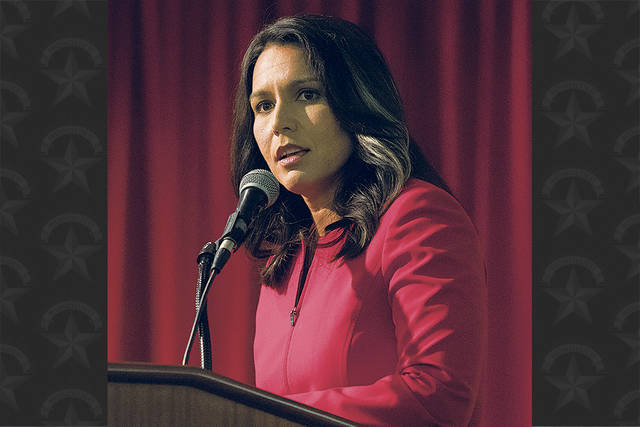U.S. Rep. Tulsi Gabbard can surprise her Hawaii constituents, sometimes taking positions that startle residents of other states as well. Watching the stumbling start to her presidential campaign this past week serves to remind: In politics, the element of surprise is not always helpful.
In fact, the candidate herself may have been surprised at the largely negative reaction she’s received, including criticism of her high-profile, controversial meeting with a Syrian dictator and her change of heart about a previous, staunchly held position against gay rights.
It’s especially not the rollout one needs in the early weeks of a campaign cycle that is likely to draw a crowded — and more-qualified — field of her party’s contenders to take on President Donald Trump in 2020. Among the declared candidates so far: U.S. Sens. Kamala Harris, Kirsten Gillibrand and Elizabeth Warren.
Even if Gabbard manages the damage-control phase and has a bit of a reboot, it’s hard to see a clear path for her to realize this particular ambition, or even to emerge unscathed in advance of a future political climb. And that raises the biggest concern of all: Will Gabbard’s continuing in the presidential race compromise the time and attention she has available for the voters who re-elected her only a few short weeks ago?
Some people evidently believe she already has signaled she is willing to put her congressional duties — and office — on the back burner. On Monday, state Sen. Kai Kahele officially announced that he plans to run for that 2nd Congressional District seat.
Of course, Gabbard has ample time to reconsider her electoral options; she doesn’t have to resign her current job to run for president, and the deadline to file for re-election to the U.S. House would be June 2, 2020. But being ready for a primary challenge requires that attention be paid to the district now.
To be fair, the congresswoman certainly has weighed in at times of need from her district, which encompasses the neighbor islands and rural and suburban Oahu. Her calendar is dotted with all the requisite activities: voting for disaster-relief funding for Hawaii, making appearances during the volcanic eruption crisis of 2018, advocating for fellow military veterans and covering the full range of other home-base issues.
There have been times, though, when Gabbard’s been oddly missing in action. Early on in her service, she once opted to go surfing as part of a Yahoo News video rather than turn out for a federal field hearing in Honolulu about the problems of the Veterans Administration.
One particular low point may have been her 2017 meeting with Syrian President Bashar al-Assad, responsible for brutal treatment of his fellow civilian Syrians. At worst, this was political malpractice and a departure from competent statecraft; at best, it exhibited an approach which, though well-intentioned, was naive.
Gabbard asserts that her actions arise from a policy focused on peace. But arriving at a peaceful solution requires, rather than freelancing, consultative and collaborative work with experts in the field. Trump has been accused of winging it in international relations; someone seeking to replace him should show better judgment.
There is also the unseemly friction with U.S. Sen. Mazie Hirono, who had questioned a judicial nominee about his religious views on key issues. The questions were on point and not a sign of religious “weaponizing,” as Gabbard asserted. They hardly rose to the level that merited a takedown of someone in her own congressional delegation.
Last week, Howard Dean, the former Democratic National Committee chairman, pronounced Gabbard as “unqualified.” Rather than persisting with this long-shot campaign, the congresswoman should buckle down on the job she now holds. Perhaps someday she’ll prove him wrong, but today, he may have a point.

